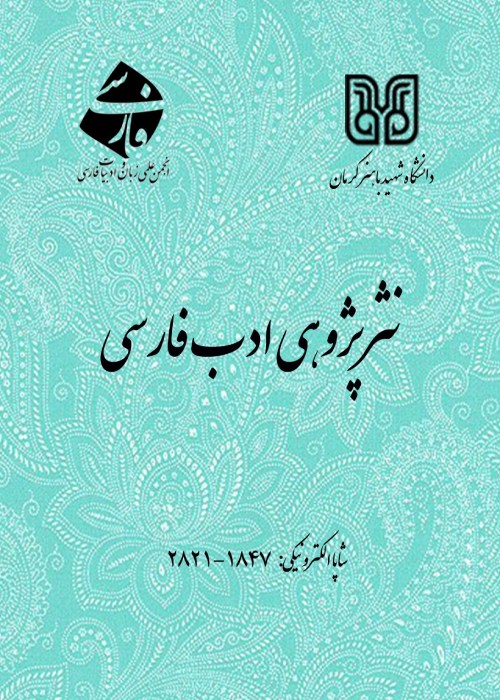Review and analysis of Anis al-Naas’s borrowings from Akhlāq-i Nāsirī
A very important educational text that has not been discussed much is the book "Anis al-Naas". This work is authored by a person named "Shoja" in the field of ethics and household management, and is referred to as "Anis al-Naas" for short. “Anis al-Naas” was published by Iraj Afshar in 1977 AD with a short introduction. There is not much information about the author of the book and only a little information can be obtained by reference to the introduction of the book. It seems that he is from Shiraz and his grandfather was also the cousin of Shah Sheikh Abu Ishaq. Shoja wrote this book in 830 AH and presented it to Sultan Ibrahim Timuri. Examining the language and content of this text shows that “Anis-al-Naas” was greatly influenced by the pedagogical and educational texts before him. From among those texts, it has many similarities with Qaboosnameh. However, a thorough analysis of the words and sentences used in this book confirms that the author of this work had the textbook “Akhlāq-i Nāsirī” in mind, and in addition to adapting the meaning and content, it has many verbal and linguistic borrowings to the extent that some sentences are taken directly from the “Akhlāq-i Nāsirī”. According to what has been said, the present study aims to answer the question whether “Anis al-Naas”, as an important educational text in the 9th century of Hijri, was influenced by the book “Akhlāq-i Nāsirī. In other words, what is the extent of the influence of “Anis-al-Naas” from the “Akhlāq-i Nāsirī” in the areas of structure, language and content?
The present study was conducted using a descriptive analytical method and was based on the library documents. Accordingly, the two books of “Akhlāq-i Nāsirī” and “Anis al-Naas” have been examined in terms of content and wording, and the similarities between the two have been investigated, and their content has been analyzed using other books. In the end, the similarities of these two texts and the methods of “Anis al-Naas” being influenced have been elaborated upon.
In the text of Anis al-Naas, we are faced with two types of borrowings and influences: a) verbal-content influence b) content influence. In "verbal-content influence", since Shoja's adaptations of the “Akhlāq-i Nāsirī” have led to a total similarity of the sentences, expressions, and words of the two texts, they have necessarily become similar in terms of content; that is, Shoja has borrowed both the meaning as well as the content. In this way, Shoja has taken the words of Khaje Nasir and included them in his book so that there is no doubt that he had “Akhlāq-i Nāsirī” in mind and these similarities are not accidental. In "content influence", the adaptations of the author of “Anis al-Naas” are purely content related, and the author has only adapted the opinions and ideas of the author of the original text, but has added his own words and interpretations to it. A look at the content list of the two books shows that at least 8 of the titles of Anis-al-Naas are similar to those of “Akhlāq-i Nāsirī”. The two tables below show the influence of “Anis-al-Naas” in both ways:Table 1: Verbal-content influences
Educational factor
Common concepts between Anis-al-Naas and Naseri ethics
The criteria for choosing a wife
for those who want to marry should be lust and sexual pleasure - paying attention to the piousness and obedience of a woman - not setting the criteria for beauty- not setting the criteria for wealth
The manners of dealing with wife
The man should keep his awe so that his wife follows him - honoring his wife through things that are the basis of affection and love
Avoiding consultation and sharing secrets with women
To avoid consulting with women in important matters of the home (not to share the secrets and the amount of capital and property due to the lack of reasoning skills)
The rights of children
to choose a decent name and entrust the child to a suitable nanny; effort in their education and training; paying attention to the number and types of children's interests; simple life education (depreciation of luxurious clothes and food) - prohibition of alcohol and intoxicants
The rights of parents
Among the rights of the spiritual father and the bearing mother are respecting the rights of parents by loving them, sacrificing their property, and showing kindness. The harassment of parents involve three things: 1- Harming them with lack of love in words and deeds 2- Covert and overt ruthlessness 3- Disrespecting their advice and instructions.
The necessity of paying attention to the encouragement and punishment of the child's behavior
Appreciate the child's good deeds and condemn his (her) bad deeds
The manners of speaking
Not to divulge anything he is aware of; Not to respond to a question addressed to others; Not to be pretentious in responding among the public
Etiquettes of eating
Not to eat with more than three fingers; Not to open the mouth wide or take large mouthfuls; Be moderate in taking a bite; Not to lick fingers; Not to care too much about eating food
The manners of drinking wine
Drink with the best and most honorable people according to one's own sex near those who are known by their word of mouth; One should read eloquent and melodious poems and anecdotes and should not be bad tempered.
Manners of buying slaves
The servant is to be seen free and must be supported and put ahead of his service. The servant is like body parts to the master. They are all made by God and should be equally respected.
Table 2: Content influences
Educational factor
Common concepts between Anis-al-Naas and Naseri ethics
The necessity of marriage and family formation
Providing the ground for marriage and family formation for the child is necessary and obligatory. For as long as it is possible to marry a maiden, one should avoid marrying a widow.
Forbidding women from playing music and masculine anecdotes
Forbidding women from socializing with men or listening to musical instruments, beautiful songs, and romantic stories so that they don't fall in love.
The manners of making a friend
One should not find fault with a friend. In case one is to talk about the faults of a friend, one should mention that in the form of an anecdote or say it openly but in private.
The manners of war
The king must not enter a war whimsically. The captives must be respected and one should not order killing them hastily.
The nature, necessity and types of love
Love is necessary for human life. There are two types of love: natural and voluntary. There are many types of voluntary love.
Analyzing the text of “Anis al-Naas” demonstrates that the author has been significantly influenced by the book "Akhlāq-i Nāsirī" written by Khaja Nasir Al-Din Tusi. This influence is sometimes in the form of verbal and propositional borrowing meaning in a way that that the sentences and expressions of Khaje Nasir are quoted exactly or with a slight modification; these have been examined under the heading of "verbal-content influences". Sometimes, however, the educational and pedagogical stuff in Akhlāq-i Nāsirī has been adapted via changing the interpretations, phrases, and sentences, which are analyzed under the title of "content influence". The statistical analysis of the common themes of the two works shows that Shoja has adapted from the Akhlāq-i Nāsirī in 15 cases. In a general view, among the three parts of the Akhlāq-i Nāsirī, Shoja has been basically influenced by the second part entitled household management. Within this process of adaptation, Shoja, generally, has a desire to describe and express in details; therefore in common topics, Anis al-Naas is more detailed and extensive than Akhlāq-i Nāsirī. On the other hand, due to the 200-year distance, and the Arabic text of Akhlāq-i Nāsirī, in cases where Shoja has intended to quote the same sentences as Khaje, he has made use of simpler words and interpretations in most cases.
- حق عضویت دریافتی صرف حمایت از نشریات عضو و نگهداری، تکمیل و توسعه مگیران میشود.
- پرداخت حق اشتراک و دانلود مقالات اجازه بازنشر آن در سایر رسانههای چاپی و دیجیتال را به کاربر نمیدهد.



